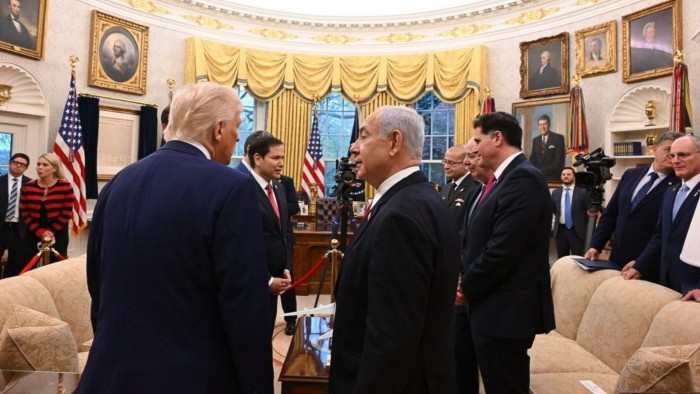Unlock the White House Watch newsletter for free
Your guide to what Trump’s second term means for Washington, business and the world
The writer is author of ‘Black Wave’ and an FT contributing editor
President Donald Trump lands on Tuesday in a region that speaks his language: the Gulf. There will be talk of trillions of dollars, pageantry and a lot of gold. There are also reports of a Qatari gift of a luxury jumbo jet to be used as Air Force One — which would be a jumbo ethical and security issue.
Trump lacks a grand vision for the Middle East. His doctrine for the region mirrors his one at home: Trump First. His primary goal is to deliver good news for the US economy with major Gulf investments and lucrative opportunities for American companies.
But Trump is also seeking foreign policy wins and they’re coming from unexpected quarters. The Houthis recently agreed to stop firing at commercial shipping in the Red Sea, including US vessels. The ceasefire might fall apart any time but, crucially, it did not cover Israel, which was hit by Houthi missiles and retaliated earlier this month. In a deal with the US, Hamas has agreed to release one American-Israeli hostage, Edan Alexander, as a gesture to Trump, reportedly with nothing in return. Families of the other Israeli hostages are bereft and furious at their government.
Hamas now hopes to secure a broader ceasefire and 2mn Palestinians in Gaza are desperate for the resumption of aid deliveries. Israel suspended those in March when it gave up on phase two of the January ceasefire.
Meanwhile, Gulf countries are positioning themselves as mature, constructive partners. They resent being seen as an ATM and Saudi Arabia’s budget is stretched by falling oil prices. But they are also being helpful — by hosting Ukraine talks, upholding a détente with Iran to helping post-Assad Syria back on its feet and supporting a new government in Lebanon.
It seems everyone is scurrying to build goodwill with Trump except Israeli Prime Minister Benjamin Netanyahu. The first sign of Trump’s irritation came during their White House press conference in April. Trump did not reverse the 17 per cent tariffs he had slapped on Israel and pointed out that Israel gets $4bn a year in aid. “That’s a lot. Congratulations, by the way. That’s pretty good,” he told Netanyahu.
The US also has a growing trade deficit with Israel. In Trump’s mind, that makes Israel a net taker. But the worst moment for the Israeli leader came when Trump revealed the US was talking to Iran directly. Netanyahu can keep a poker face but the strain was visible. The president is no humanitarian and doesn’t lose sleep over the devastation in Gaza. But he is also unhappy about Netanyahu’s plans for a renewed military campaign in Gaza that runs counter to his grand vision for a Gaza Riviera — never mind that it was cruel and unworkable to begin with.
The US keeps springing surprises on Netanyahu, cutting Israel out of the deals it is making. Next up could be a potential civilian nuclear deal with Saudi Arabia, which would bypass the initial proposition of Israeli-Saudi normalisation in exchange for a Saudi-US defence pact. If ever there was a golden opportunity for Israel to secure a future at peace with all its neighbours, that was it. For Netanyahu, the price — the promise of a future Palestinian state — is too high. He callously suggested the Saudis could create one in the kingdom, outraging Riyadh.
The decades-long alliance between Israel and the US will endure and reports of a rift have been swiftly denied. But Trump’s message to Netanyahu is clear: get with the programme. And the programme does not include forever wars with unachievable goals — all tactics and no diplomatic gains. Most of all, Trump cares little for military campaigns designed to ensure the political survival of Netanyahu and his far-right coalition but deliver no victories that make the US president look good.
Whether the sum total of Trump’s Middle East moves crystallises into an actual vision for the region is deeply uncertain. The key problem, as with everything from tariffs to Ukraine, is the White House’s spaghetti approach: throw ideas at the wall, see what sticks, bag the first whiff of a win as a major victory, move on or change tack.
Trump’s envoy for everything, Steve Witkoff, is stretched thin. That’s how the January ceasefire in Gaza fell apart — sloppy follow through, no attention to detail. The cost was devastating for Palestinians. The stakes are too high in the very technical Iran nuclear talks for such an approach. A quick victory would deliver a weak deal that could push Netanyahu to act alone and strike Iran’s nuclear sites — plunging the region into chaos and sinking all the “beautiful deals” Trump will sign this week.
Read the full article here




